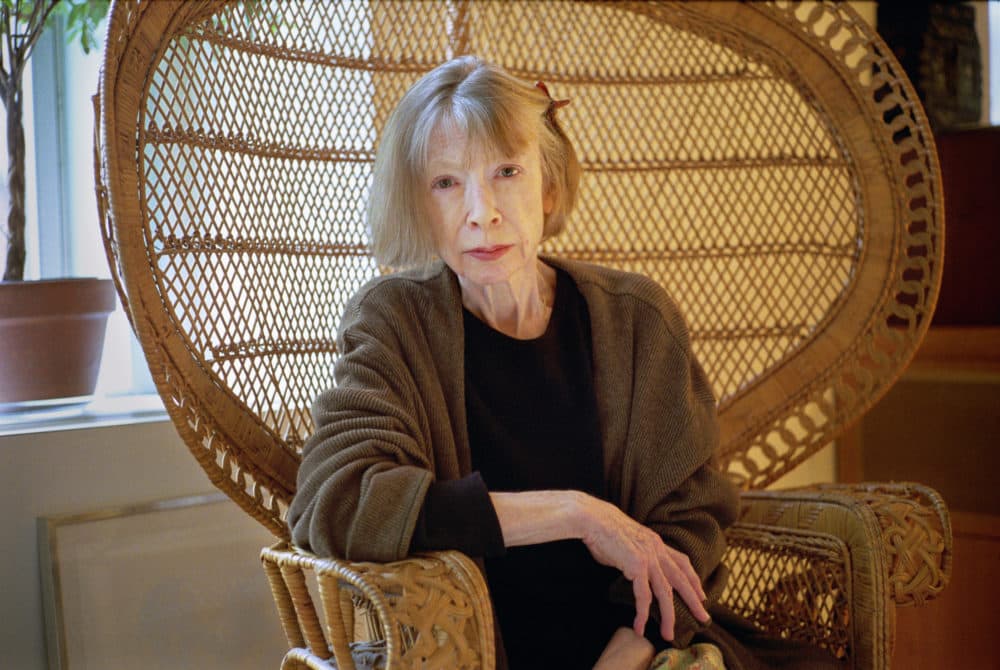Advertisement
Commentary
A cure for the Covid winter blues? Joan Didion

Here we are, once again, staring down the barrel of COVID winter. Nearly everyone I know is struggling with some form of ennui. And yet, things are so much better now than they were last year, aren’t they? Back then, my kids went to Zoom school in the dining room, while my husband and I took shifts working our full-time jobs upstairs. This time last year, before the vaccines, Anthony Fauci and every other public health expert begged us to stay home for the holidays; I seriously considered getting Shake Shack for Thanksgiving, because I couldn’t bear the idea of turkey without the adventure of making gravy with my mother.
“It occurs to me that we allow ourselves to imagine only such messages as we need to survive.”
That’s a sentence from Joan Didion’s “A Year of Magical Thinking.” I read it recently while sitting in bed — waiting on one of those hydrating Korean sheet masks to work its magic – and it sent me down a Didion rabbithole. It seemed so apt for our time, when occasionally it feels like the only way to keep going, is to imagine what we’ll do once the pandemic ends.
Yes, things are better. But they are not normal, at least not “old” normal, and they probably never will be. I’ve been stuck resisting that reality.
So, there I was, googling away, deep-hydration in progress, spelunking the internet for more Didion wisdom to make sense of this nonsensical time.
A friend said the other day: we are starting to do routine things again, going out to dinner, going to the office, but nothing feels routine. She’s right: it’s all just a little off. Plus, my kids still eat lunch outside under a tent every day and making plans for the future remains impossibly hard. Is it safe to give my 74-year-old dad Celtics tickets for Christmas? Can we have a party for my twins’ 8th birthday this winter? Nobody knows. One of the COVID era's biggest menaces, grinding uncertainty, shows no sign of abating. Will my kid be safe at school? I have a runny nose … is it COVID or a cold?
Remember that heady month, June 2021, when the vaccines were rolling and everybody was preparing for their own version of “hot-mom-summer”? The before times were elbowing back into view. Then came delta. Just when we thought the pandemic might be winding down, COVID executed the world’s greatest takeback. And now many of us have returned to wondering what day it is. Hopes, dashed.
So, Didion. When I was in my late 20s, I stumbled on “On Self Respect,” the 1961 essay she reportedly whipped off in an afternoon to fill an unexpectedly empty column space in Vogue. For months, I carried a printed copy of the piece in my bag; it’s the most perfect 1,740 words. (Predictably, the essay sent me directly to the bookstore for a copy of “Slouching Towards Bethlehem.”) I was going through a difficult stretch of my career at the time, and doing a lot of accounting of who I was meant to be. It’s a miracle I didn’t tattoo this concluding line on the inside of my left forearm: “To have that sense of one’s intrinsic worth which constitutes self-respect is potentially to have everything: the ability to discriminate, to love and to remain indifferent.”
Advertisement
Believe it or not, Didion’s essay, some talk therapy and one lucky trip to see Oprah’s final show (a tale for another time) snapped me out of my budding quarter-life crisis and into action. It was unnerving to feel so laid bare by a 50-year-old piece.
What moved me then (and now) is what moves many admirers of Didion’s work: the precision, the clarity, the sharpness. Her essays go zing — straight to the heart — no throat-clearing, no platitudes. We need more of that.
So, there I was, googling away, deep-hydration in progress, spelunking the internet for more Didion wisdom to make sense of this nonsensical time. I somehow landed on her 1975 commencement address at the University of California-Riverside:
"I'm not telling you to make the world better, because I don't think that progress is necessarily part of the package … I'm just telling you to live in it. Not just to endure it, not just to suffer it, not just to pass through it, but to live in it. To look at it. To try to get the picture.”
Her essays go zing -- straight to the heart -- no throat-clearing, no platitudes. We need more of that.
How much better off we’d be to hold such bright and devastating ideas at the same time.
I don’t possess Didion’s gift for clarity or juxtaposition (does anyone?) but I’ve found other ways to make things plain. When the pandemic numbness is too much, I run. Sometimes I even lace up when it’s raining. I know I’ll get soaking wet, but I also know I won’t melt. There’s something beautiful and affirming in the simplicity of that physical certainty.
My friend who’s been working very hard in the last year to get people vaccinated told me the other day to “hang in there this winter,” but also that “we are so close to the end.”
After so many false starts, I don’t know what to make of that. I’m not sure I believe it. But Didion gets my last word: “Everyday is all there is.”
This segment aired on November 26, 2021.
